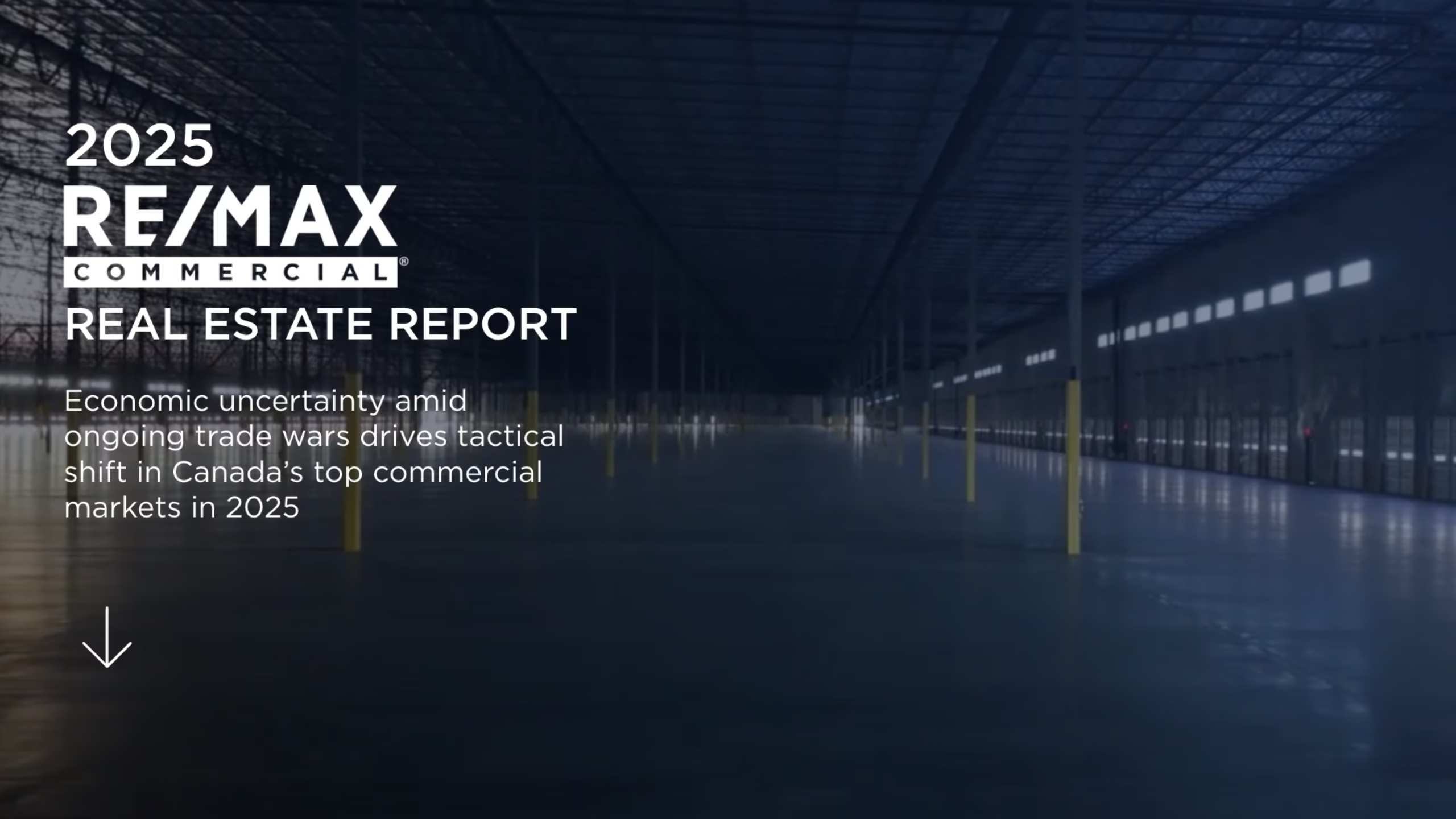Alberta, Saskatchewan, Manitoba and Newfoundland-Labrador lead the country in commercial activity
REMAX analyzed first-quarter activity across 12 major Canadian commercial real estate markets and found that investors are capitalizing on opportunities that allow for strategic repositioning, adaptive reuse and targeted investment, as escalating global trade tensions, economic concerns and evolving market conditions loom large.
Canada’s commercial landscape continues to evolve as investors and asset holders adapt to optimize portfolios and performance against a changing economic climate. Multi-family and industrial were the top-performing asset classes, followed by retail. Commercial markets continue to move forward at a steady pace, fuelled by ongoing pressure on the country’s existing housing stock, government policies set to advance growth such as the Housing Accelerator Fund, and a continued upswing in e-commerce sales.
Canada’s commercial real estate market is shifting to fundamentals this year.” Don Kottick, President, REMAX Canada
Canada’s Commercial Growth Leaders in 2025
Western Canada’s commercial markets, alongside Newfoundland-Labrador, led the country in terms of commercial growth in 2025, buoyed by an increase in population, greater investment activity, and solid economic performance.
Population growth continues to propel the multi-family asset class. Bolstered by public policy, private and public investment is driving a resurgence in the construction of purpose-built rentals nationwide, while demand remains strong for existing portfolios. Industrial is the backbone of the commercial sector, with growing strength in the country’s logistics corridors.
While smaller, traditional malls continue to experience challenges, retail is proving resilient overall, with neighbourhood nodes outperforming – especially those anchored by essential shops and services. Although growing pains are expected, commercial markets are ultimately positioned for growth once the market shakes current transitory challenges and clarity emerges.
The most resilient and opportunity-rich markets are those where investors are proactively reshaping aging or underused assets to align with present and future demand.
REAL ESTATE TRENDS TO WATCH IN 2025 BY RE/MAX CANADA
Policy-Driven Growth
Government policy, including the Housing Accelerator Fund (HAF), has supported the recent upswing in multi-unit purpose-built rentals development. In fact, the federal government has earmarked an additional $74 million to top-performing HAF communities to fast-track construction of 112,000 new homes by 2028, by ending restrictive zoning, accelerating permits and advancing densification near transit and post-secondary institutions.
112K – The number of new homes fast-tracked to 2028, thanks to the Housing Accelerator Fund.
Over the next decade, the program is forecast to create 750,000 new homes for people in towns, cities and indigenous communities across Canada. Yet, more stimulation is needed to address Canada’s housing crisis. The reintroduction of the popular Multiple Unit Residential Building (MURB) tax credit, directly responsible for the construction of close to 200,000 rental units in the 1970s, would further aid in expediting growth.
Shifting Investment Priorities
At present, investors are revisiting the value proposition in select markets. Development has stalled in cities such as Vancouver, where high interest rates and elevated construction costs have upended the value proposition and the viability of previously planned projects. More stimulus is required against a backdrop of increased distressed sales of condominium development.
Land Assets
Falling land values in the city have developers recalibrating, weighing the prospect to sell at a loss or hold until values recover while servicing mortgage debt and absorbing negative cash flow. Demand for development land has slowed as a result, with interest now shifting to income-generating properties that can ride out current headwinds.
At present, investors are revisiting the value proposition in select markets. Development has stalled in cities such as Vancouver, where high interest rates and elevated construction costs have upended the value proposition and the viability of previously planned projects. More stimulus is required against a backdrop of increased distressed sales of condominium development. Falling land values in the city have developers recalibrating, weighing the prospect to sell at a loss or hold until values recover while servicing mortgage debt and absorbing negative cash flow. Demand for development land has slowed as a result, with interest now shifting to income-generating properties that can ride out current headwinds.
“Land is no longer just about future potential—it’s about present performance. It’s about cash flow,” says Kottick. “Increasingly, investors value properties that deliver steady rental income to help portfolios weather market volatility and economic uncertainty.
Industrial & Multi-Family Assets
Industrial and multi-family asset classes have both experienced a serious upswing in inventory levels over the past year. An influx of new industrial product has softened absorption rates nationwide, prompting some tenants to pursue retrofits of older properties with lower lease rates. The same dynamic is playing out in multi-family markets, where increased inventory has eased rent pressures and pushed vacancy rates upward in traditionally tight markets like the GTA and Vancouver where vacancies are now climbing.
Tourism Boosts Local Markets
Despite economic headwinds amid trade tensions, Canadian cities and towns have become increasingly popular destinations among Canadian and international tourists alike.
Fundamentals are now driving decision-making and creative approaches to unlocking new value,” says Kottick. “The opportunities are there—for those that are prepared to rethink, reinvest and reposition. The good news is investors tend to easily adapt, pivot and embrace flexibility—an art in and of itself and a primary factor underpinning resilience in Canada’s commercial market. As a result, activity is expected to remain stable, regaining further momentum once economic performance improves.”
© 2025 REMAX, LLC. Each office is independently owned and operated.
About the REMAX Network
As one of the leading global real estate franchisors, REMAX, LLC is a subsidiary of REMAX Holdings (NYSE: RMAX) with more than 140,000 agents in over 9,000 offices with a presence in more than 110 countries and territories. REMAX Canada refers to REMAX of Western Canada (1998), LLC, REMAX Ontario-Atlantic Canada, Inc., and REMAX Promotions, Inc., each of which are affiliates of REMAX, LLC. Nobody in the world sells more real estate than REMAX, as measured by residential transaction sides.
REMAX was founded in 1973 by Dave and Gail Liniger, with an innovative, entrepreneurial culture affording its agents and franchisees the flexibility to operate their businesses with great independence. REMAX agents have lived, worked and served in their local communities for decades, raising millions of dollars every year for Children’s Miracle Network Hospitals® and other charities. To learn more about REMAX, to search home listings or find an agent in your community, please visit remax.ca. For the latest news from REMAX Canada, please visit BLOG.REMAX.CA
To learn more, visit RE/MAX.CA
To learn more about OTTAWA COMMERCIAL
To learn more about HALIFAX COMMERCIAL
To learn more about SASKATOON COMMERCIAL
To learn more about EDMONTON COMMERCIAL











